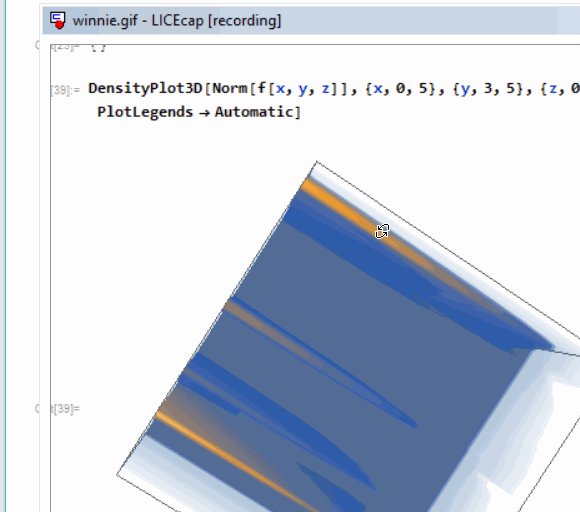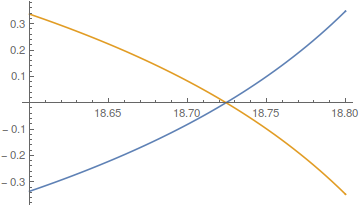The equation f[x,y,z] does not lend itself well for finding roots.
I first tried to explore the space of the function, and got some error messages (stating that the equation could not be solved, etc).
n = 3;
A2 = {{0, 0, 0, 1, 0, 0}, {0, 0, 0, 0, 1, 0}, {0, 0, 0, 0, 0, 1}, {-2,
1, 0, 0, 0, 0}, {1, -2, 1, 0, 0, 0}, {0, 0, -1, 0, 0, 0}};
lambda = {l1, 1, 1, l4, l5, 0};
ee[p_] := SparseArray[{{p, 1} -> 1, {6, 1} -> 0}] // Normal // Flatten
eqns1 = {(0.9786935821895908` a1 + 0.7848513153478486` a2 +
0.4355596199317594` a3) Cot[
0.4450418679126288` t] + (-0.15544942857434468` a1 +
0.08626792451566725` a2 + 0.19384226684174244` a3) Cot[
1.2469796037174667` t] +
0.30141660916782004` a2 Cot[1.8019377358048383` t] ==
1 + (0.13414301076393745` a1 + 0.24171735309001358` a3) Cot[
1.8019377358048383` t], (1.2204109352796038` a1 +
0.9786935821895927` a2 + 0.5431339622578357` a3) Cot[
0.4450418679126288` t] + (0.28011019135741444` a1 -
0.15544942857434632` a2 - 0.3492916954160916` a3) Cot[
1.2469796037174667` t] + (0.0596992560778067` a1 +
0.10757434232607628` a3) Cot[1.8019377358048383` t] ==
1 + 0.13414301076393761` a2 Cot[1.8019377358048383` t], a1 == 0};
lambda1[tt_] :=
Check[{a1, 1, 1, a2, a3, 0} /. Solve[eqns1 /. t -> tt] // Flatten,
Indeterminate]
eqns2 = # ==
0 & /@ (MatrixExp[s*A2].(lambda + Inverse[A2].ee[2 n]) //
FullSimplify)[[n + 1 ;;]];
lambda2[ll1_, ss_] :=
Check[({l1, 1, 1, l4, l5, 0} /. Solve[eqns2 /. s -> ss, {l4, l5}] //
N // Flatten) /. l1 -> ll1, Indeterminate]
f[l1_, t_, s_] :=
f[l1, t, s] =
Check[(lambda1[t] - lambda2[l1, s])[[{1, 4, 5}]], Indeterminate]
space = Table[{x, y, z} -> f[x, y, z], {x, 0, 5}, {y, 0, 10}, {z, 0,
5}];
Extract[space, Position[space, Rule[a_, Indeterminate]]]
(*{{0, 0, 0} -> Indeterminate, {0, 0, 1} -> Indeterminate, {0, 0, 2} ->
Indeterminate, {0, 0, 3} -> Indeterminate, {0, 0, 4} ->
Indeterminate, {0, 0, 5} -> Indeterminate, {1, 0, 0} ->
Indeterminate, {1, 0, 1} -> Indeterminate, {1, 0, 2} ->
Indeterminate, {1, 0, 3} -> Indeterminate, {1, 0, 4} ->
Indeterminate, {1, 0, 5} -> Indeterminate, {2, 0, 0} ->
Indeterminate, {2, 0, 1} -> Indeterminate, {2, 0, 2} ->
Indeterminate, {2, 0, 3} -> Indeterminate, {2, 0, 4} ->
Indeterminate, {2, 0, 5} -> Indeterminate, {3, 0, 0} ->
Indeterminate, {3, 0, 1} -> Indeterminate, {3, 0, 2} ->
Indeterminate, {3, 0, 3} -> Indeterminate, {3, 0, 4} ->
Indeterminate, {3, 0, 5} -> Indeterminate, {4, 0, 0} ->
Indeterminate, {4, 0, 1} -> Indeterminate, {4, 0, 2} ->
Indeterminate, {4, 0, 3} -> Indeterminate, {4, 0, 4} ->
Indeterminate, {4, 0, 5} -> Indeterminate, {5, 0, 0} ->
Indeterminate, {5, 0, 1} -> Indeterminate, {5, 0, 2} ->
Indeterminate, {5, 0, 3} -> Indeterminate, {5, 0, 4} ->
Indeterminate, {5, 0, 5} -> Indeterminate}*)
f[x,0,z] is indeterminate.
Let's see how the function behaves in the rest of the space.
We can take the norm of the function. Zeros should be where the norm is zero.
DensityPlot3D[Norm[f[x, y, z]], {x, 0, 5}, {y, 3, 5}, {z, 0, 5},
AxesLabel -> {x, y, z}, PlotLegends -> Automatic]

As you can see there are several planes of interest. You should focus on finding the roots within those ranges exclusively.


